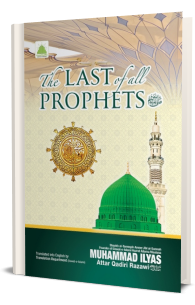
Our Majestic Prophet
The Excellence of the Prophet’s Vision
(Part: 24)
Mawlana Rashid Ali Attari Madani
Two narrations were explored in the last issue:
اَنَا فَرَطُكُمْ عَلَى الحَوْضِ
“I am your forerunner at the Pool ˹of Kawthar˺.”[1]
اَنَا شَهِيدٌ عَلَيْكُمْ
“I am a witness upon you.”[2]
Two blessed attributes of the Prophet صَلَّى الـلّٰـهُ عَلَيْهِ وَاٰلِهٖ وَسَلَّم were mentioned in these narrations, forerunner and witness. The former was thoroughly explained. In this article, we will continue our study of the latter, namely, the beloved Prophet صَلَّى الـلّٰـهُ عَلَيْهِ وَاٰلِهٖ وَسَلَّم being a witness, and add a few details about him as a forerunner.
Grief of Departure and Joy of Union
The statement “I am your forerunner,” indicates that the Prophet صَلَّى الـلّٰـهُ عَلَيْهِ وَاٰلِهٖ وَسَلَّم would be leaving his noble Companions. This was such news that would have saddened all of his devotees, but the beloved Prophet صَلَّى الـلّٰـهُ عَلَيْهِ وَاٰلِهٖ وَسَلَّم gave them good news, saying:
إِنَّ مَوْعِدَكُمُ الحَوْضُ
“Your promised place to meet will be Kawthar.”[3]
A Description of Kawthar
The same hadith adds, “I swear by Allah! I am looking at my fountain now.” This is clear evidence that it exists and is not a figment of the imagination. It is necessary to believe in its existence. Whosoever denies its existence is a heretic.[4]
Imam Jalāl al-Dīn al-Suyūṭī رَحْمَةُ الـلّٰـهِ عَلَيْه states, “The reports about Kawthar have been narrated from more than 50 noble Companions عَـلَيْهِمُ الرِّضْوَانْ.”[5] The strength of the beloved Prophet’s vision was such that he saw Kawthar whilst on earth.
Here are some points regarding the great attribute “شَهِيدٌ”
I am with you
Commenting on the hadith, “I am a witness upon you,” Imam Shihāb al-Dīn al-Qasṭalānī رَحْمَةُ الـلّٰـهِ عَلَيْه states:
It means that I am a witness to your actions. It is as if the Prophet صَلَّى الـلّٰـهُ عَلَيْهِ وَاٰلِهٖ وَسَلَّم is with his Ummah; he has not left them but has remained to witness their deeds. During his life and after his departure from this world, the Prophet صَلَّى الـلّٰـهُ عَلَيْهِ وَاٰلِهٖ وَسَلَّم is a guardian of the Ummah with regards to their matters in this world and the hereafter.[6]
This hadith suggests that the Prophet صَلَّى الـلّٰـهُ عَلَيْهِ وَاٰلِهٖ وَسَلَّم will be waiting at the fountain while also witnessing our actions. Therefore, we should not not perform any actions that will distance us from Kawthar.[7]
Names Derived from Divine Names
You are aware that there are some blessed names of Allah Almighty which He bestowed upon His beloved Prophet صَلَّى الـلّٰـهُ عَلَيْهِ وَاٰلِهٖ وَسَلَّم, like رءوف, رحیم, حکیم, عادل, صادق, نور, ھادی, etc. Mufti Naqī ʿAlī Khan رَحْمَةُ الـلّٰـهِ عَلَيْه writes that Allah Almighty conferred upon the Prophet صَلَّى الـلّٰـهُ عَلَيْهِ وَاٰلِهٖ وَسَلَّم 67 of His names.[8]
Likewise, “شَهِيدٌ” is a name of Allah that was granted to the Prophet صَلَّى الـلّٰـهُ عَلَيْهِ وَاٰلِهٖ وَسَلَّم.
Meaning of شَهِيدٌ
The dictionary definition of “شَهِيدٌ” is witness, to be present and watching, etc. The famous lexicon, Lisān al-ʿArab, states:
الشهيدُ الَّذِي لَا يَغيب عَنْ عِلْمه شَيْءٌ
“ شَهِيدٌ is the one from whose knowledge nothing is absent.”[9]
Witness and Testimony
Mufti Aḥmad Yār Khan Naʿīmī رَحْمَةُ الـلّٰـهِ عَلَيْه writes a beautiful passage about the beloved Prophetصَلَّى الـلّٰـهُ عَلَيْهِ وَاٰلِهٖ وَسَلَّم being a “witness”:
A witness always has these three qualities:
1. The individual must have been present at the scene of the incident and observed what happened. Then he will give his testification in the presence of the judge. This is why he is called شاہد or شَهِيدٌ, i.e., one who is present.
2. The plaintiff works to ensure that the testimony is successful to win the case. The defendant tries to challenge the integrity of the witness to deem him unreliable. He cross-examines the witness, objects to his claims, and argues that the witness is uninformed in a bid to dismiss his testimony.
3. An objection to the witness is an objection to the plaintiff. Therefore, they consider the witness an enemy. In the world, the beloved Prophet صَلَّى الـلّٰـهُ عَلَيْهِ وَاٰلِهٖ وَسَلَّم bore witness to the Creator, Paradise, Hell, and all things hidden to us. Before coming into this world, he stayed in the proximity of the Creator and saw everything, with his advent taking place thereafter. He will be a witness to the actions of creation in front of Allah on the Day of Judgement.
For this to happen, it is necessary to always be aware of every action. Know that the Prophet صَلَّى الـلّٰـهُ عَلَيْهِ وَاٰلِهٖ وَسَلَّم will testify against those who deny the vastness of his knowledge. They are the defendants, as the one who challenges the knowledge of the witness is the one who will be testified against. Also, objecting to the knowledge and excellences of the Prophet صَلَّى الـلّٰـهُ عَلَيْهِ وَاٰلِهٖ وَسَلَّم is an objection against Allah Almighty, for the noble Prophet صَلَّى الـلّٰـهُ عَلَيْهِ وَاٰلِهٖ وَسَلَّم is Allah’s witness.
Remember, the testification of the Prophet صَلَّى الـلّٰـهُ عَلَيْهِ وَاٰلِهٖ وَسَلَّم is of four types: testification of Allah Almighty before the creation, testification of creation before Allah Almighty, testification of Allah Almighty in front of Allah Almighty, and the testification of creation in front of creation. Whoever the Prophet صَلَّى الـلّٰـهُ عَلَيْهِ وَاٰلِهٖ وَسَلَّم deems as destined for Paradise, he will certainly enter Paradise, and whomsoever he deems as a good person, he is definitely a good person. Whatever the Prophet صَلَّى الـلّٰـهُ عَلَيْهِ وَاٰلِهٖ وَسَلَّم deems lawful is lawful, and whatever he proscribes, it is unlawful. This is because witnesses are absolute.[10]
One meaning of “شَهِيدٌ” is “Hazir and Nazir”
“شَهِيدٌ” can also mean to be present in attendance. Mufti Aḥmad Yār Khan Naʿīmī رَحْمَةُ الـلّٰـهِ عَلَيْه states that ˹Shahīd˺ can also mean “present,” i.e., the Prophet صَلَّى الـلّٰـهُ عَلَيْهِ وَاٰلِهٖ وَسَلَّم is present and watching every part of the universe.
Today, doctors say that the medicine should be stronger than the illness, so that it suppresses it, otherwise, the medicine will be suppressed by the illness itself. The Devil is an illness, and the Prophet صَلَّى الـلّٰـهُ عَلَيْهِ وَاٰلِهٖ وَسَلَّم is the cure. The Quran states:
اِنَّہٗ یَرٰىکُمۡ ہُوَ وَ قَبِیۡلُہٗ مِنۡ حَیۡثُ لَا تَرَوۡنَہُمۡ ؕ
“Indeed, he and his tribe see you from where you see them not.”[11]
Satan watches over the entire world, so he can mislead those who intend to do good. If the beloved Prophet صَلَّى الـلّٰـهُ عَلَيْهِ وَاٰلِهٖ وَسَلَّم was kept completely uninformed, an objection could be raised that Allah Almighty created a powerful illness and a weak cure. Therefore, it is essential for the Prophet صَلَّى الـلّٰـهُ عَلَيْهِ وَاٰلِهٖ وَسَلَّم to be aware of everything, at all times, in order to give guidance effectively.[12]
Observations of the Prophet صَلَّى الـلّٰـهُ عَلَيْهِ وَاٰلِهٖ وَسَلَّم
The root letters of شَهِيدٌ are “ش ہ د”, with the root noun being “مشاہدہ”on Baab Mufa’ala of the Arabic scales. Shaykh ʿAbd al-Ḥaqq al-Dihlawī رَحْمَةُ الـلّٰـهِ عَلَيْه states: “The six directions were made as one for the Prophet صَلَّى الـلّٰـهُ عَلَيْهِ وَاٰلِهٖ وَسَلَّم.” In other words, he could observe all directions at once.[13]
The beloved Prophet’s vision was unlike anyone else’s. He could see events and places from thousands of miles away. For example, the Prophet صَلَّى الـلّٰـهُ عَلَيْهِ وَاٰلِهٖ وَسَلَّم explained what was happening during the Battle of Mutah whilst he was more than a kilometre away in al-Masjid al-Nabawi.[14] During salah, the Prophet صَلَّى الـلّٰـهُ عَلَيْهِ وَاٰلِهٖ وَسَلَّم extended his hand towards the grapes of Paradise and also observed Hell.[15] He صَلَّى الـلّٰـهُ عَلَيْهِ وَاٰلِهٖ وَسَلَّم observed the entire world similar to how one looks at the palm of his hand.[16]
We can agree the pages are too narrow and we do not have the ability to encompass the excellences and greatness of the beloved Prophet صَلَّى الـلّٰـهُ عَلَيْهِ وَاٰلِهٖ وَسَلَّم. May Allah Almighty grant us true love for the Prophet صَلَّى الـلّٰـهُ عَلَيْهِ وَاٰلِهٖ وَسَلَّم.
اٰمِیْن بِجَاہِ خاتَمِ النَّبِیّیْن صلَّی اللہ علیہ واٰلہٖ وسلَّم
[1] Ṣaḥīḥ al-Bukhāri: 6,589
[2] Ṣaḥīḥ al-Bukhāri: 4,085
[3] Ṣaḥīḥ al-Bukhāri: 4,042
[4] Sharh al-Saawi ‘ala Jawharat al-Tawheed, p. 398; Tuhfat al-Mureed, p. 442
[5] Al-Budoor al-Saafirah, p. 241
[6] Irshad al-Sari, vol. 13, p. 688, hadith: 6,590
[7] Irshad al-Sari, vol. 3, p. 485, hadith: 1,344
[8] Suroor al-Quloob Fi Zikr al-Mahboob, p. 318
[9] Lisān al-‘Arab, vol. 2, p. 2,107
[10] Shan-e-Habib al-Rahman, p. 182
[11] Al-Quran, 7:27
[12] Shan-e-Habib al-Rahman, p. 183
[13] Madarij al-Nubuwwah, vol. 1, p. 7
[14] Ṣaḥīḥ al-Bukhāri: 4,262; Musnad Imām Aḥmad: 22,566
[15] Ṣaḥīḥ al-Bukhāri: 5,197
[16] Majm’a al-Zawaid, vol. 8, p. 510, hadith: 14,067


















Comments